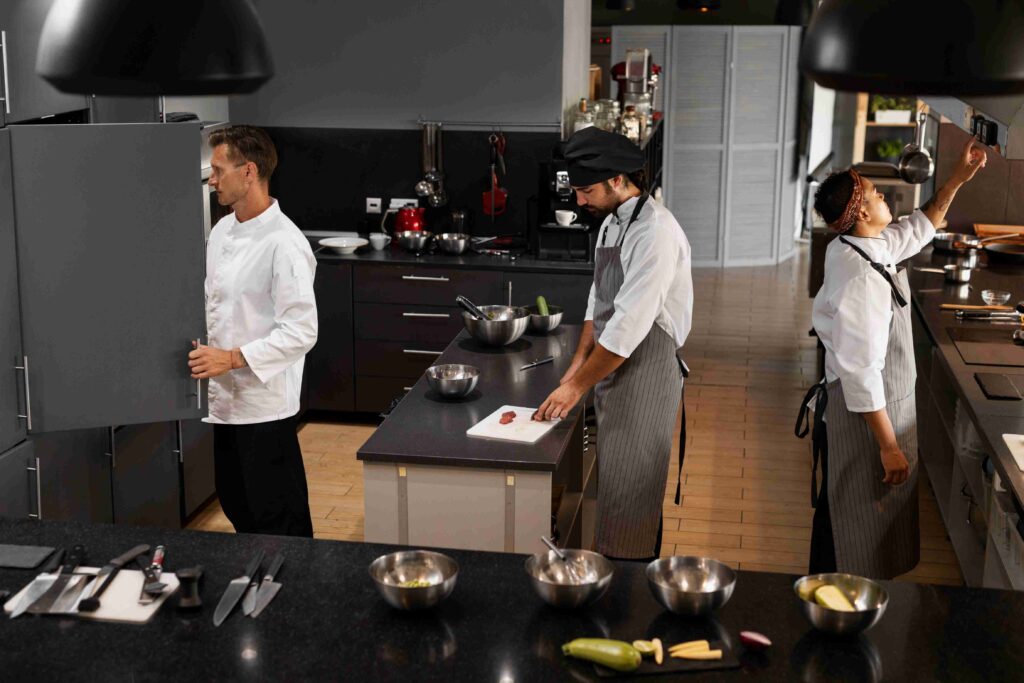In a busy professional kitchen, reducing cooking time is essential for maximising productivity and delivering a seamless dining experience. Quick service not only impresses customers but also allows for higher table turnover, which can drive more revenue. To achieve this, it’s crucial to have a well-structured kitchen, streamlined processes, and high-quality ingredients. Working closely with your food wholesaler can also provide additional support, such as access to prepared ingredients and equipment designed to increase kitchen efficiency. Below are some practical strategies to help your kitchen team save valuable time.
1. Optimise Your Kitchen Layout for Smooth Workflow
A well-thought-out kitchen layout can save considerable time. Setting up a “work triangle” between preparation, cooking, and cleaning stations allows chefs to move efficiently without unnecessary steps. For example, placing ingredients close to the preparation area and tools within arm’s reach at cooking stations minimises downtime. Food wholesalers often offer storage solutions like stackable containers, freezer shelves, and prep racks that help organise kitchen essentials. For example, having designated racks for pre-cut vegetables or spices from your wholesaler can keep everything needed for each dish within easy reach.
2. Streamline Your Menu with Core Ingredients
Reducing the number of menu items can greatly cut down on cooking time. By focusing on a few core dishes, chefs can perfect techniques and speed up prep. Many restaurants choose to create menus with overlapping ingredients, which not only saves on storage space but also reduces the time needed to prepare each dish. For instance, if several dishes use similar vegetables, like bell peppers and onions, your food wholesaler can supply these in bulk. Many wholesalers even offer pre-chopped vegetables, saving your team from doing it manually.
3. Pre-Portion Ingredients and Use Efficient Prep Techniques
Pre-portioning is one of the best ways to make cooking faster. This practice reduces time spent measuring or cutting ingredients during peak service hours. Some food wholesalers provide pre-portioned ingredients, like bags of portioned pasta or containers of sauces. By partnering with your wholesaler for ready-to-use items, such as marinated meats or pre-cut produce, you can reduce prep time. For example, using pre-marinated chicken breasts for salads and mains allows chefs to move quickly from prep to plating. A well-stocked pantry with these time-saving ingredients also means your team can keep up with high customer demand without compromising on quality.
4. Invest in High-Performance Kitchen Equipment

Advanced kitchen equipment can speed up cooking significantly. Convection ovens, for instance, cook faster by circulating hot air, ensuring dishes like roasted vegetables or meats are done in a fraction of the time. Similarly, induction cooktops heat instantly, unlike traditional gas stoves, which need preheating. Many food wholesalers carry or can source kitchen equipment suitable for high-speed cooking, and they often have insights into which brands are most efficient. With the right tools, such as a blast chiller to cool down dishes quickly, you can maintain high standards while serving customers faster. A blast chiller, for example, is ideal for cooling soups and sauces, making them ready for storage or quick service without long waiting times.
5. Train Your Staff with Time-Saving Techniques
Efficiently trained staff are invaluable in a fast-paced kitchen. Techniques like batch cooking, where chefs prepare large quantities in one go, can drastically reduce overall cooking time. For example, making large batches of a popular sauce or stock in advance saves time during busy hours. The mise en place method—organising ingredients and tools before cooking—ensures that chefs have everything they need ready at their stations. By ordering frequently used items from your food wholesaler, you can restock popular ingredients quickly and ensure your staff is always equipped. Wholesalers often provide training resources or insights on the best ingredients for batch cooking, which helps maintain quality across high-volume orders.
6. Choose High-Quality Ingredients That Cook Faster
High-quality ingredients often cook more efficiently. For example, quick-cook grains like couscous and quinoa are excellent bases for salads or side dishes and are much faster to prepare than traditional rice. Some wholesalers offer pre-cooked grains, allowing chefs to assemble dishes without waiting for cooking time. Additionally, ingredients like pre-marinated meats or parboiled vegetables can save valuable minutes on the stove. Using pre-marinated meats means less prep and faster cooking, especially during peak hours. With these types of products from your wholesaler, your team can focus on plating and finishing touches rather than extensive cooking.
7. Bulk Ordering and Organised Inventory Management
Maintaining an organised inventory is essential for a smooth kitchen operation. Bulk ordering staples like grains, oils, and spices not only ensures you have everything you need but also saves time on frequent restocking. For example, purchasing oils and commonly-used spices in larger quantities reduces the need to reorder weekly. Many food wholesalers offer bulk discounts on pantry essentials, allowing for consistent inventory and reducing last-minute shopping trips. By working with a reliable wholesaler, you can arrange regular deliveries and keep ingredients well-stocked, allowing your kitchen to operate efficiently day after day. Organised inventory also helps staff quickly locate needed items, reducing time wasted on searching.
Read More: How You Can Keep Your Commercial Kitchen Neat and Clean (Ultimate Guide)
Conclusion
Efficiency in a professional kitchen hinges on smart planning, effective equipment, and high-quality ingredients. By optimising layout, streamlining the menu, and working with a reliable food wholesaler, you can greatly reduce cooking time in restaurants and improve service quality.
Embrace these strategies to create a kitchen that not only saves time but consistently delivers excellent dishes, delighting customers and enhancing your reputation.






